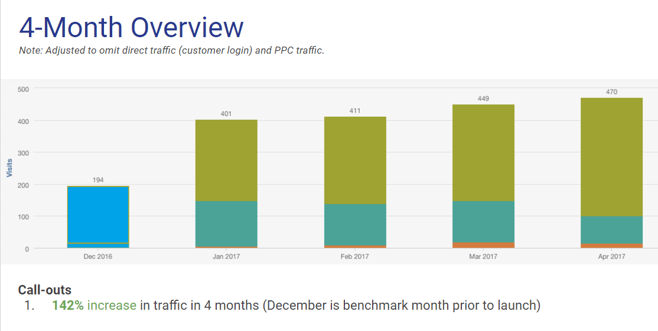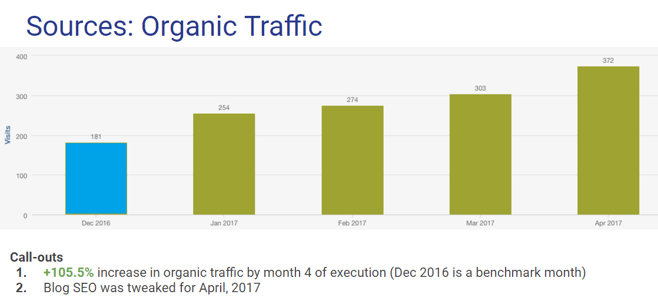We live in a highly connected world, and SEO (what is that?) brings your business into the offices, living rooms, and smart phones of your prospective buyers.
But is SEO on its own enough to help you accomplish what you're setting out to accomplish, and will an SEO agency generate the tangible results that you're actually looking for?
'Tis the season!
As you know, this is the time of year when decision makers like you reflect on the previous year's sales & marketing investments. If you're like any of the folks I talk to this time of year, you're looking at Q1 and Q2, and now in a position to enact changes to improve sales trending.
This is when the discussion around digital marketing starts heating up. After all, the internet is clearly not going anywhere, and many of your competitors have already found ways to tap into its power.
And, if the conversation is revolving around digital marketing, SEO is probably at the top of your list for your next new or evolved marketing investment.
But is SEO actually going to deliver results that mean anything?... besides fancy reports showing you graphs that go UP at the end, what do you expect to actually GET out of it?
Looking for more clarity on what SEO can actually do for you?
Here are 5 things you should consider before pulling the trigger on an SEO-only marketing investment:
1. What is the functional purpose of your website?
There are a couple of specific scenarios where I think an SEO-only strategy could be the best play. The most obvious are websites representing legacy brands like Ford or Coca Cola, and sites that exist purely to get eyes on ads, because they have a model for monetizing ad clicks (click-bait, if you will).
I also think many b2c products and services benefit from pure traffic, particularly if they are commodotized, and, again, well-known. However, when education is needed, such as in products or services that are disruptive or that require a certain level of esoteric knowledge to understand and appreciate, SEO may only get you so far.
B2b is an area that, in my opinion, requires quite a bit more than website traffic to generate tangible financial returns. The sales cycle is longer (and therefore riskier), there are multiple influencers and decision-makers, and there is more money involved.
So, if your company is b2b, what is the website's functional purpose? Is it to serve as a brochure to your services or act as a lead generation engine?
When I ask my prospective clients this question, I usually leave out the multiple choice and let them come up with the answer. 9 times out of 10 the answer is "I don't know," or, more commonly, "to serve as a brochure or backstop to my salespeople's efforts."
If you're telling me "brochure," and still sticking to that answer after seeing the multiple choice options, then I'd say that a pure SEO investment is going to be a total waste of resources. I think you're better off just overhauling your website, and working with your sales team to build something that fits their sales process. (build a website quote)
If you're telling me "lead generation," SEO could be exactly what you need. However, it may not be the ONLY thing you need.
2. What is causing you pain right now?
The big question on my mind is, "why are you here?" What is it that's causing you to seek out a new direction in marketing? Something about your existing system isn't working, sure... but is it website traffic? Is that the ONLY missing piece?
Let's work backwards. You're here because sales aren't what they ought to be. If that's not the case, and you're just here for "branding" purposes, I'm not going to have any valuable advice... So, if it's sales, how does your website play into that? Are you generating customers from it already and just looking to scale?
If so, SEO could be all that's missing.
Here's a little exercise. Compare your existing metrics with these numbers, and let's determine if traffic is all you actually need:
- Visitors-to-contacts - Your website can and should convert between 2% and 5% of all visitors into contacts. What is yours currently doing?
- Contacts-to-customers - Contacts generated by your website have the highest level of engagement with your brand and products/services than any lead you'll ever buy. You should be able to convert between 2% and 10% of them into customers.
More marketing objectives that matter.
Okay, so let's say your website falls within those ranges - then yes, perhaps an SEO-only investment is exactly what you need. The rest of your answers will be very telling though.
Are you more of a "visual person?" Then, download this marketing objectives ROI calculator:
It breaks down this exact formula, helping you see how much website traffic you actually need to achieve your business objectives.
There may be some better investment options out there, or at least options that include SEO, but don't strictly rely on it - that are better suited for your situation. For example, with "inbound marketing" we center our campaigns around SEO, but we take a shotgun approach, and develop different ways to convert visitors into leads and leads into customers.
3. Are you generating customers from your site as it is today?
If your pain is sales-related, the next question is, what is your website doing for your company today? Already generating customers and just need to scale? Then, SEO is looking pretty strong.
But be honest about it. One of my software clients was convinced that they were generating 1 new $100k+ client every other month or so. They were also convinced that they were generating close to 10 strong leads from their website every month.
When they engaged us for full-scope inbound marketing, our goal was to hit 15 leads per month by month 7 of execution. However, after we had all of our analytics tools in place, we realized that those 8 "quality leads" were nothing more than solicitations from "SEO ninjas" and other spammers. And those "customers?" Yeah, no... they were from other sources, NOT the website itself. The real number was a dreadful ZERO.
So, in reality, we were starting from SCRATCH with these guys.
It's a good thing the owner wasn't JUST concerned with traffic when he engaged with us, because in addition to driving more traffic to the website, we also put together lead conversion mechanisms and email nurturing.
By month 4, we had more than doubled their overall traffic AND organic traffic. More importantly, we were on our way to hitting our 15 leads per month by month 7 REGARDLESS of being misinformed of their prior benchmarks and starting at 0.
Additionally, we were promised a traffic rate of more than 2,000 visitors per month, but what we discovered after implementing Hubspot was that the large majority of those were "direct," and were actually existing customers logging into their portal.
So, that 2,000 actually turned out to be less than 200.
Fortunately, we were suspcicious of these claims, because there was no system in place to actually validate any of them. So, the plan we put together considered this fact, and it didn't ultimately matter. We didn't SMASH our goals like we thought we would, but still hit 'em!
ACTUAL results:


Even more importantly than THAT, we were influencing sales efforts across the board. By month 4, they were up 500% in YOY sales, and we could see that the leads coming in from other sources were interacting with our inbound content unlike any of the years prior.
They were reading blog posts and downloading our functional downloads (Excel spreadsheets with important formulas), and the conversations during the assessment phase were much easier, because their prospects were more educated and engaged thanks to our inbound content.
Like I said, it's a GOOD thing they didn't just engage us to get more eyes on the website.
Interested in learning about the methodology that led to those great results? Check out our guide to getting started with inbound.
4. Do you have lead conversion mechanisms in play?
I suppose this is the million dollar question if you're still feeling like SEO is the right answer. If you do have lead conversion mechanisms in play (anything that you give away in exchange for contact information - downloads, access to webinars, etc), and they're working, and you continue to add to them on a regular cycle through your own resources, then yes, SEO is most likely all you need at this point to boost sales.
Download the 2016 inbound marketing case study here.
Ah, but if these conversion mechanisms are NOT multiplying, that would give me pause. Why? Because you may want to create content for the different personas (what is a persona?), and you're going to learn about their wants and needs through their behaviors... THEN there's the different stages of the buyer's journey (aka "buyer decision process")!
After all, people who are still discovering the source of their pain are not going to respond to the same tactics that work well with those who are seeking solutions to said pain.
Learn more about the buyer's journey or "buyer decision process."
5. What does "SEO" actually mean to you?
With inbound, "SEO" is everywhere and nowhere at the same time. It's a philosophy more than it is a tangible deliverable, and it comes through:
It's the language people use when searching for answers to problems your company solves.
The thing about SEO that many people struggle with is the idea that it can be programmed into a website... that it's a one-time investment or something you update every now and then.
That's the way it USE to be. But that was never Google's intent. On the contrary, Google has invested (and will ALWAYS invest) in quality control mechanisms that generate search results that are meant to feel like they're reading your mind... results that reflect intent over input.
They're measuring the experiences people have on your site once they are there, and that's how they determine who they send your way next.
Like any relationship, trust takes time, and as long as your website delivers on its promises, Google, Yahoo, and Bing will continue to increase your traffic-flow.
This is how "white hat" SEO works. It's a grind. It take a continuous touch. Google has made a point to publicly state that they want to see websites growing and evolving. This is why we blog. It's one of the reasons why we're always adding new offers and measuring and updating the user experience.
It's why we deploy the Growth Driven Design methodology (what is that?) when developing a website.
... but there is another way. Maybe you're looking for more of a parabolic spike in traffic, and if that's the case, then perhaps the black-hat stuff is the way to go. I would never personally recommend it, because I don't have the stomach for the risk. But for some people, the long-term isn't important, and for them, I am not a good resource... inbound is not a good resource.
Here are some of the more common black-hat methodologies (which Google is aware of and fighting against):
- Keyword stuffing - The practice of cramming keywords into the site somewhere, usually illegible/hidden. Google tries to steer you clear of this strategy by making it near impossible for analytics tools like Hubspot to see which keywords people were typing in their search queries before landing on your site.
But rules are made to be broken, according to some, and Google is aware of this, which is why they have harsh punishments for those who insist on cheating. - Link farms - The practice of creating fake domains or directly listings that are developed for the sheer purpose of creating inbound links. Google LOVES inbound links (it's what made Google Google), which is why this practice ever happened in the first place.
However, Google HATES fake domains. Why? Because it side-steps their quality mechanisms... Why do they care so much? Simple - Google is the number one search engine with nearly 80% of the global searches because their results are the most relevant. People use Google because it works better.
But if the results stop being relevant, you'll move on to the next big thing. The other thing Google has noticed is that the sites installing spam, viruses, malware, and adware into your computer NEVER follow the rules. They don't have the time to. So, it's a good way for them to weed out the things that could actually HARM its users.
Google is not a mystery if you're in it to win it. They have made it very clear that if you uphold their philosophical beliefs of education and quality user experiences first, everything else second, you will succeed in gaining their favor over time.
Google explicitly states on their website,
"Webmasters who spend their energies upholding the spirit of the basic principles will provide a much better user experience and subsequently enjoy better ranking than those who spend their time looking for loopholes they can exploit."
Here are the points they published about what they want to see:
- Make pages primarily for users, not for search engines.
- Don't deceive your users.
- Avoid tricks intended to improve search engine rankings. A good rule of thumb is whether you'd feel comfortable explaining what you've done to a website that competes with you, or to a Google employee. Another useful test is to ask, "Does this help my users? Would I do this if search engines didn't exist?"
- Think about what makes your website unique, valuable, or engaging. Make your website stand out from others in your field.
GOOGLE RESOURCES:
CONCLUSION:
SEO is just one component of a HUGE network of marketing initiatives that are designed to help you grow. The key to whether you hire an SEO agency vs inbound marketing agency is about whether you have the up and downstream pieces already figured out. Most don't. Most go into this with the idea that SEO will solve the problem of growth by traffic volume. But if you go that route, you may be disappointed with the tangible impact it has on your business.
Learn more about how to incorporate SEO into a Growth plan by exploring our Inbound Marketing Services page:



